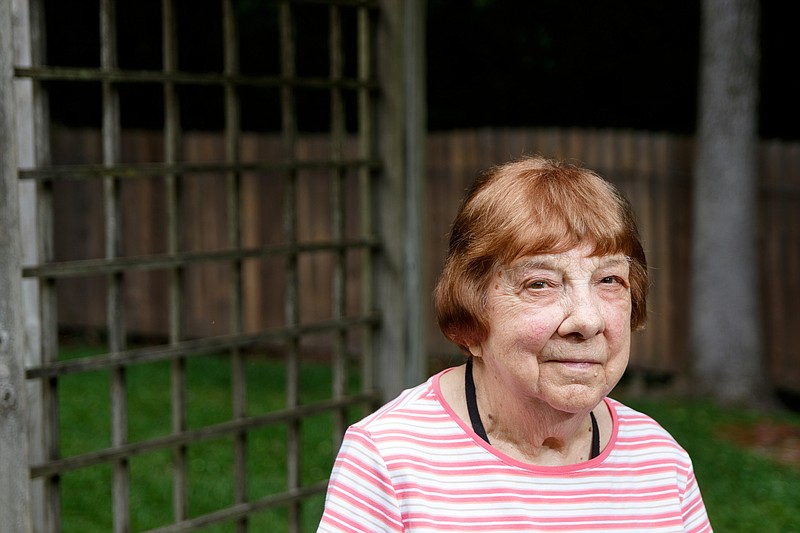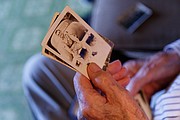Sitting in her Summerville, Georgia, home, 100-year-old Rose Jackson sat on her couch recounting bits and pieces of her experience as a U.S. Army nurse in World War II.
"D-Day, really, you stop and think," she said of the day Allied Forces invaded France's northern coastline 74 years ago. "Cause that was some day, that D-Day was. Don't you think? ... So many people lost their lives. And you just don't think about it."
Not one for the spotlight, Jackson hesitantly told a few of her stories. She, like many other World War II veterans, doesn't remember a lot of details from 74 years ago; a lot has happened since then.
Jackson was one of the 20 U.S. Army nurses with the 5th Evacuation Hospital who landed on Omaha Beach on June 10, 1944, just four days after D-Day.
"If you ever crossed the English Channel, you're a dead duck," she said. "... Some of the boys got real sick. I mean, it was rocky."
After making it across the English Channel on the British Infantry Landing Ship, according to the World War II U.S. Medical Research Centre's website, all 5th Evacuation Hospital personnel debarked in barges and ferries, and after assembly, spent their first night in Normandy in an apple orchard on a bluff.
The Medical Research Centre's account of the landing described the beach as looking like an "immense junkyard," littered with landing craft either impaled by anti-landing obstacles put in place by enemy forces or half sunk, wrecked by mines or shattered by enemy shellfire.
"Discarded equipment littered the beach, with items such as lifebelts, empty cartridge clips, canteens, web gear, rations, and countless mementos of the battle that preceded the 5th's arrival," the website states.
"From then on, [what we saw was] fallen soldiers," Jackson said, picking up her handbook of information, pointing to old photos. "We went through five campaigns, so we got five battle stars."
In all, Jackson's hospital saw 25,544 admissions.
"We had some darn good doctors," she said. "See, a lot of the patients would come off the front lines and have to go to surgery."
It was rough, she said. She was in the surgical ward, so she took care of the patients after they got out of surgery. There were a lot of bad patients, a lot of nice patients. Some died, some didn't.
"I remember one boy that was paralyzed from [the chest] on down," she said. "I was lighting a cigarette for him, and he wrote to me after he got back in the States. He was such a nice person."
Jackson said they usually didn't keep the patients there very long. As soon as the doctors felt like they were stable enough to transport, they were transferred to the general hospitals back in the U.S. and England.
"We couldn't keep them because we moved," she said. "As the army moved, we moved, too."
Even being behind the battle, they'd still hear the bombs in the distance and, occasionally, one would hit nearby, but there was no time to be afraid.
"You were busy all the time, and you really didn't think too much about it," she said. "But we were fortunate that nobody got hurt that was in our outfit."
___
Further behind the combat zone than Jackson was former U.S. Army Tech Sgt. Hoyt Williams Sr.
"D-Day was the beginning of the end of the war," he said, thinking back on what the day meant.
Williams, now 94, didn't get to Normandy Beach until the second wave of landings, so the beaches were "pretty well cleared" by the time he got there. But his job was important, nonetheless.
He worked in an engineering supply house, receiving and dispersing supplies, such as bulldozers and cranes, as well as tools to draw maps, to the people who needed them.
Combat engineers would build bridges and roads with the heavy machinery.
"'Course we went right to work," he said of his landing on Omaha Beach. Supplies were coming in and going out "just about as fast as you can imagine."
He doesn't remember how far inland his company went or how long they stayed in one spot. But every time combat troops advanced, they advanced, following them up into Germany.
Even being behind the battle, Williams said his camp was attacked a number of times.
The Germans strafed their camp a few times, he said.
"You know, airplanes go over shooting at you," he explained. "I don't think anybody got hit. It was just a scary thing, mostly."
At one point, he remembers enemy forces lobbed shells from the English Channel. The shell exploded and shrapnel flew through their tent and hit a countertop, but no one was hurt.
"You get used to everything then," he said. "We knew that we were driving the Germans back. We were all just looking for the day we could drive them out."
___
Closer to the front line, fighting from the skies, was former U.S. Army Air Corps Staff Sgt. Leo Lanier Jr.
Lanier and Williams grew up together in Trion, Georgia.
Lanier, an ex-prisoner of war, wasn't there for D-Day, but he fought in the war before and after the invasion of Normandy. He went on 33 bombing missions throughout his service in World War II, and he kept a diary during much of his two tours of duty before he was captured.
In diary entries printed in the Summerville News, Lanier detailed several instances in which he saw planes go down and men jumping in parachutes.
"We saw our first men in parachutes, and could only imagine what a lonely feeling that must be, floating thousands of feet to an unknown destiny," he wrote on Oct. 4, 1943, from Frankfurt, Germany.
Even knowing he may not make it home, Lanier and his entire high school football team volunteered right after graduation in 1942, and after finishing 26 missions, he volunteered to go again in late 1944.
Lanier was the tail gunner on his seventh mission when his crew's plane was hit, leading to the capture of three of the nine men. All these years later, he still doesn't know what happened to the other seven.
"Today was another beautiful day, and we were bombing a German airfield, near Brandenburg, Germany," read his April 10, 1945, diary entry.
He and his crew were flying at about 22,000 feet and anti-aircraft fire was heavy.
"They seemed to have us pinpointed for a target," he wrote.
The plane was hit and the explosion knocked out their number one engine. The next hit both outboard engines, and a fire started. Then the control cables were hit, and Lanier was knocked out of his bicycle-type seat but was not hit. The pilot then told them their right wing was on fire and ordered them to jump as soon as they could.
"I do not know the time it took to float down, but it seemed forever, not knowing what would be waiting when I landed," Lanier wrote.
He and two others were the last to exit the plane, and they all landed about half a mile apart. On the ground, they could hear the bombs hitting from the crews flying behind them.
"We got captured pretty quick, the three of us together," he said, remembering the day. "And then we got put in Camp Luckenwalde, [a POW camp]."
He said the Germans tried moving them via trains, but they ended up returning to the camp. Finally, Russian crews came and liberated them, taking some German soldiers as well.
"We saw many dead Germans around, booth young and old," Lanier wrote in his diary. "Many fought behind trees or wherever they took their last stand. The Russians buried their own, but not the Germans."
He doesn't remember how long he spent as a prisoner of war; it's been so long ago. And he doesn't go into much detail about what happened while he was there. His wife, Reita Lanier, said it took him decades to even tell her he was a prisoner of war, and he still hasn't talked about what happened overseas.
A lot of civilians died as a result of the air raids, he said, reflecting on the effects of the war.
"We didn't think much about it, I guess, at the time," he said. "But that was civilians. That was boys, I mean children and older people."
Unlike others, Lanier doesn't forget what happened in World War II. He can't forget.
"There are a lot of things you'd like to forget, but sometimes you never do."
Contact staff writer Rosana Hughes at rhughes@timesfreepress.com or 423-757-6327. Follow her on Twitter @HughesRosana.

